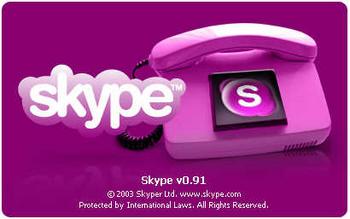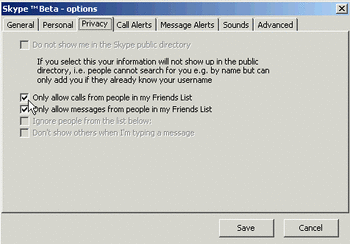Art is vision, not expression.
Please Skype Me: Disruptive P2P VoIP Technology Allows You To Call And Talk Free To Any Windows PC
First Disruptive P2P VoIP Instant Messenger Challenges Phone Industry Rip-Off Pricing: Talk Live To Anyone With A PC Right Now!
Skype
http://www.skype.com/
![]() = breakthrough tool
= breakthrough tool
Software Tool (Win 2K/XP)
FREE
Available in English, Swedish and Estonian, Skype is new free live P2P audioconferencing tool for people using Windows XP and Windows 2000. Conceived by the same guys behind Kazaa, the famous P2P file and music sharing tool, Janus Friis and Niklas Zennstrom, Skype is a final statement confirming my repeated announcements that VoIP is ready for prime-time.
Skype is a very effective and well designed professional VoIP tool and I can safely assure that if you try it out for yourself you will not be disappointed. Skype allows VoIP under the very worst adverse conditions including users behind firewalls and NATs which have always had difficulties in properly communicating with other communication and conferencing tools.
Though I have announcing the availability of great Web conferencing tools that sport reliable and performing VoIP solutions since 2002 Skype comes in to solidly fill the niche left too long open by the major instant messenger (YM, AOLIM, MSN, ICQ) tools, which have never been able to provide a truly effective VoIP solution, and by the early telephone challengers such as Mediaring, Net2Phone and Dialpad.
Skype is based on the same FastTrack P2P network that Kazaa and other file sharing tool utilize. Unlike Yahoo Messenger Skype relies on a P2P (peer-to-peer) network, meaning that the voice packets being sent do not go over a centralized server that redistributes them, but are sent directly between users.
The advantage(s) of this over other similar new services like Vonage and Free World Dialup is that Skype does not rely on a centralized infrastructure to maintain the directory of users and to route each and every call. This means that for those services based on a centralized infrastructure costs scale proportionally with their user base while providing quality and reliability becomes always more difficult to achieve.
Skype appears as a simple to use instant messenger with a strong integrated voice over IP functionality. Installation, setup and ease of use get all top marks.
If you have used an instant messenger before there is nothing new to learn. Making a call is a simple as selecting a "friend".
Voice quality and latency (delay) is truly impressive. In my initial tests I have measured a transmission delay always below 500ms (less than half a second).
Echo cancellation features are seamlessly integrated and there is no problem in talking even when you have your speakers on (a typical and very fastidious problem of first generation VoIP systems).
There is nothing to press to talk and the microphone is always "open" on both sides. The version available now allows only one-to-one calls and it does well support all users on dial-up lines as slow as 33.6 Kbps.
An integrated and minimalistic text chat window provides support for text exchanges in a simple and unobtrusive fashion. If you're voice-talking to someone, you can still chat with someone else at the same time.
Considering that after downloading Skype you can be up and talking in less than 5 minutes I found this new id on the block a truly positive experience.
In just its first week of availability, 60,000 people downloaded the free Skype software. Other voice over Internet Protocol (VoIP) services, such as Vonage or Free World Dialup (FWD), needed several months to attract the same level of interest.
Skype and the people behind it have timely caught the tremendous opportunity left by a telephony market characterized by "rip-off pricing" and a reliance on heavily centralized infrastructures.
From what I have seen while testing Skype is the effective work done to resolve once and for all many of the typical problems and limitations inherent in VoIP systems. Delay, latency, drops, voice quality, bandwidth, echo cancellation, talking controls, automatic voice activation and more. Though Skype comes out with a victory on this front it is fair and honest to say that while voice quality can easily surpass audio phone quality, a few inherent problems remain for now hard to resolve completely.
Something for example that can be hardly avoided in voice communications over IP is the fact that when your computer starts doing something else on its own (download email, load a Web page in the background) voice packets do not make it as reliably as they should and you can have a few long silent moments or some broken up words.
Skype's user interface was designed with ease of use in mind , we tried to combine the ease of use of cell phones. Everyone knows how to use them. With instant messaging, it also gives you the ability to see when your friends are online.
Skype has adopted a few little touches in the "look and feel" of Skype that make this tool a true breeze to use. The addition of realistic ringing tones and hang up sounds make using Spyke as if it was a telephone an immediately rewarding experience.

I would personally expect Skype to have a tremendous viral effect in its ability to auto-promote and distribute itself. Something that all other pioneering VoIP systems never had enough momentum and popularity to leverage effectively. In its first week of availability Skype has been downloaded more than 60,000 times making it a very rapid achiever if compared to the time it too Kazaa to achieve the same clout.
Nothing better than Skype and similar communication tools can leverage the power of viral marketing as the best use for the tool can only be made when a friend or colleague has it as well.
One important advice if you decide to try out this tool is to immediately set your Privacy Preferences to accept incoming calls ONLY from elected friends. As I wasn't aware of this seeting, during my initial testing I received several calls from many different parts of the world from new Skype users who were looking for friendly people like me to talk to.
On a technical note Skype does NOT use SIP or other advanced communication protocols normally being used by other similar tools but the company remains open to make its technology interoperable with other VoIP solutions.
Minimum System Requirements:
PC running Windows 2000 or XP
400 Mhz processor
128 Mb
10 MB free disk space on your hard drive
Sound Card, speakers and microphone
Dial-up Internet connection (minimum 33.6 Kbps modem)
For more info see Skype online at http://www.skype.com/
Download your free copy of Skype right here. (2.7 MB)
Recommended!
[via Igor Raznatovic]
| 2004-05-02 17:18:52 |
| 2004-04-23 19:55:27 |
According to the Skype site, you can now "conference call" with up to 5 people at the same time.
| 2004-04-11 12:24:04 |
The only BIG problem is in fact it only works, as i can read from their website, in windows 2000 or windows XP - not with windows 98!!
That's for me, and for many good users, a great deal for microsoft - i will try it to use with windows 98 - but if doesn't work i go off try something else.
Please don't help the microsoft monopoly.Best regards.
| 2004-03-15 16:20:59 |
Well, I wouldn't call it "quite a revolution in communication technology ".
I remember we used to talk with a VoIp software long before Napster invented P2P.
It is true, we could call and talk, and understanding was something else.
Skype looks much better if you consider the voice quality, thanks also to the fact that now we have faster connection.But what people really want?
When they want to call they want a telephone ( mobile) they want to dial a number and they want to talk.
If possible cheap and why not for free...The real revolution is what we can give:
www.worldonip.com
1) Access point that reaches up to 15 Kilometers and up to 90 users on one line.
2) Wireless mobile IP telephone that works in a coverage of 15 Kilometers( 10 miles) costs around 200 dollars, is as easy to use as any other GSM .
3) Any phone can call for free another Ip phone, locally, Nationally, Internationally, Intercontinentaly.
Can call any other phone using a termination.The VoIP Access Point costs around $1400 and you can share it among 90 people.
This is a Technological revolution.
Hard to believe, but it is true.Marconi invented the Wireless and Antonio Meucci invented the Telephone, it happens that we talk the same language...
Patrizia
patrizia@worldonip.com
| 2004-03-14 19:38:10 |
At first glance Skype seems to be quite a revolution in communication technology and appears to be ready to put other competitors down.However the Skype software uses P2P technology that evolved from Kazaa and Joltid and employs user cpu's and bandwidth to connect calls other than your own.
What this means to me is that my bandwidth usage will rise as more people start using Skype.Since most ISP's have bandwidth usage limitations, it means that I may have to pay for other peoples calls if I go over my limit.
When I had Kazaa, I was downloading everything I saw in my excitement, and ended up paying the price for it.I just wonder if this will happen with Skype.
Please correct me if I have this wrong.
| 2004-02-12 10:06:20 |
Hi. Skype site is not reachable. Where can I download the software.
Also I would like to know will it work on Win 9X family?. What are the settings required if I am behind the proxy server.
Thanks in advance
Saravana Kumar T L J
| 2004-02-06 17:05:34 |
will skype work with direcway net work?
| 2003-12-07 18:23:14 |
My comment is not specific to this post, but related to it, and Skype and VoIP in general.
It's hard to say this without sounding like a trouble-maker, but honestly that is not my intention. I want to encourage you to think about employing a SIP-based solution, if not now, please keep it in the back of your mind.
The advantge of SIP for all of us is that it is an interoperable standard, being embraced and adopted by many vendors. SIP is like the 802.11b of VoIP. It means we can (soon) buy phones at Bestbuy and like email, if we have a SIP address with one provider, we can still make calls to people on other providers.
Skype, on the other hand, is like Compuserv. It is a proprietary closed system. It might even be that Skype today offers a better overall product experience in practice, so I can understand why people use it. SIP-based products and services have to compete, but I think they will continue to get better, so I hope you continue to consider SIP-based solutions.
With SIP, if I want to use my PC as a phone I can (e.g. xten.com, or many others) or if I want to use an IP phone, I can also, and I can choose from any number of vendors/styles/models etc. just like I can choose an 802.11-based wireless solution from any of several vendors. With Skype, I have one vendor, one choice of platform.
Anyway, I'm glad you benefit from Skype, but I hope in the not too distant future you find a SIP-based solution that meets your needs. If not, then we have failed, and we all suffer.
| 2003-11-12 09:07:52 |
Patrick,
you are right. At present Skype allows only one-to-one conversations.
As I understand it this is part of their extraordinary viral marketing approach in which after a very larger user base is in place and all rough edges of the tool have been reported, identified and eliminated (thanks to such and fast growing user base), premium services are rolled in at a price.
These will very likely include multi-party audio-conferencing and several other very interesting features.
If you are looking for a reliable and quality tool that does audio conferencing today and whuch you can use for business purposes, you don't have to look further than:
a) Voxwire http://www.voxwire.com/
b) ITI Group http://www.itigroup.com/
c) Webconference.com http://www.webconference.com/
d) RoomTalk.net http://www.roomtalk.net/These vendors market the same identical breakthrough audio technology under different names. This audio technology is indeed the best VoIP solution across all types of bandwidth connections I have been able to test to this day.
Even solutions from much costlier providers do not come as close to the reliability and quality of this solution which can be set to utilize only between 4 and 19 Kbps!
To try out for yourself go to this URL with your microphone attached to your PC:
http://tinyurl.com/uo4b
or
http://tinyurl.com/fbhf
or
http://tinyurl.com/uo4iOnce in there, press and hold your left Ctrl key and talk a few words. Release the Ctrl key and hear yourself as anyone around the world would hear you with this technology.
I am certainly available to provide more info on this topic.
All the best,
Robin G.
| 2003-11-12 08:50:14 |
Thanks Jermaine and Anon for your good comments.
I have posted an extensive follow-up to this initial article about Skype in a new one entitled:
"Skype Problems And Limitations" and which you can read at: http://tinyurl.com/uo34Cheers,
Robin G.
| 2003-11-11 20:28:48 |
But it is not "audioconferencing"
It only allows 1-to-1 calls
| 2003-11-05 00:53:48 |
Economic - companies save a goodly amount on conference calls if this feature is ever implemented. Other than that, not much for now. Realistically, if you are in Italy and wanna talk to someone in Canada, chances are it will be easier for you to find a phone rather than a computer with a relatively decent connection and a headset. This may change eventually. The thing that interests me is that tens of thousands already using skype are now placing calls by screen name, not phone number. That may truly be the wave of the future...cell phones already use digital and packet based communications, so calling someone by typing in a name without bothering with a number is easily possible in the not-too-distant future.
Privacy - don't let anyone who isn't on your friends list place calls to you and you're set. It may really be that simple, and is certainly not something you can do with an ordinary telephone. That in and of itself makes it worth the effort for those of us sick of sales calls.
Security - skype is encrypted and routed over the internet...intercepting a conversation that goes on for any length of time would be difficult unless you were near an end point due to the flexibility of internet routing (espeically from, e.g. Italy to Canada). Decrypting what you get would also take a lot of time. Essentially, your real time communication is safe...someone may decrypt it tomorrow or a month from now, but not in real time unless they already have the key. Of course, they can save it indefinitely until they do decrypt it, if they feel the need (decryption requires serious processing power, serious amounts of time, and thus serious desire to hear the conversation).
Does anyone know what audio sampling/compression they're using? It sounds amazing good but there barely any delay, so I assume it must be something new and proprietary.
| 2003-10-23 21:55:18 |
what are some economic, privacy, and security implications of the new Skype VoIP technology?
| 2003-10-05 21:25:54 |
Skype is the best!
| 2003-09-19 15:20:28 |
Yes. According to the website, though some future facilities like conference calls and direct to phone calls are likely to be on a subscription or 1 off payment basis.
JOn
| 2003-09-16 03:20:05 |
yes it is and is realy impressive, i have compaed it with microsoft msn, and the difference in quality is huge.
| 2003-09-16 01:48:50 |
It's free in the beta period, but the EULA says that there is going to be a subscription model coming.
| 2003-09-15 19:42:03 |
Yes! Skype is free no matter where you are calling. You can be calling from Antartica to Siberia and it will be as free as for those calling from Rome to Viterbo.
Try to believe!
| 2003-09-15 18:15:49 |
is skype 100% free no matter who or where u call?


